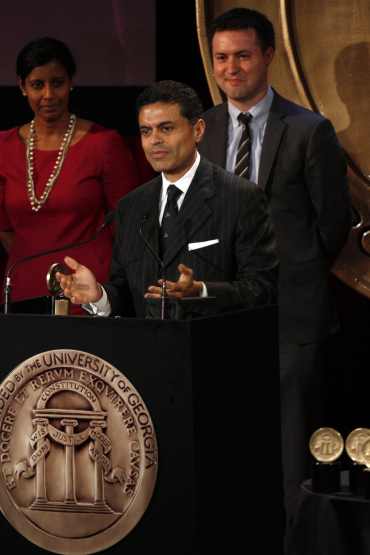 Noted Indian-American journalist and author Fareed Zakaria has been suspended by his employers CNN and Time magazine after he admitted to plagiarism and apologised for the ethical lapse.
Noted Indian-American journalist and author Fareed Zakaria has been suspended by his employers CNN and Time magazine after he admitted to plagiarism and apologised for the ethical lapse.Zakaria, was suspended by CNN and Time magazine after he admitted that he had plagiarised portions of an article he wrote on gun control for Time, from the New Yorker magazine.
He issued an apology saying he had made a "terrible mistake" and his lifting a paragraph from the article by Harvard University professor of American history Jill Lepore was an "ethical lapse".
Zakaria, 48, a Yale and Harvard graduate, had written the column on gun control that appeared in the August 20 issue of Time magazine.
Time said it was suspending Zakaria's column for a month, pending review.
"Time accepts Fareed's apology, but what he did violates our own standards for our columnists, which is that their work must not only be factual but original; their views must not only be their own but their words as well," Ali Zelenko, a spokeswoman for the magazine said.
"As a result, we are suspending Fareed's column for a month, pending further review," Time said.
CNN, on which Zakaria hosts a weekly foreign affairs show 'Fareed Zakaria GPS', said it would suspend the show for an indefinite period pending review.
"We have reviewed Fareed Zakaria's Time column, for which he has apologised. He wrote a shorter blog post on cnn.com on the same issue which included similar unattributed excerpts. That blog post has been removed and CNN has suspended Fareed Zakaria while this matter is under review," CNN said.
In a statement Zakaria said, "Media reporters have pointed out that paragraphs in my Time column on gun control, which was also a topic of conversation on this blog, bear close similarities to paragraphs in Jill Lepore's essay in the April 23rd issue of The New Yorker. They are right. I made a terrible mistake."
"It is a serious lapse and one that is entirely my fault. I apologise unreservedly to her, to my editors at Time and CNN, and to my readers and viewers everywhere," Zakaria added.
Zakaria is a CNN host, an editor at large at Time, a Washington Post columnist and an author.
A frequent commentator and author about issues related to international relations, trade and American foreign policy, Mumbai-born Zakaria was bestowed with the prestigious Padma Bhushan in 2010 for his contribution towards journalism.
He was managing editor of Foreign Affairs magazine, editor of Newsweek International for ten years before moving to CNN in 2010.
Fred Hiatt, the Washington Post's editorial page editor, said he also would start examining Zakaria's work.
"Fareed Zakaria is a valued contributor. We've never had any reason to doubt the integrity of his work for us. Given his acknowledgment today, we intend to review his work with him," Hiatt said.
A passage in Zakaria's Time column 'The Case for Gun Control' is very similar to one written in an essay by Lepore in the New Yorker magazine. The similarities in the columns were first spotted by a conservative website NewsBusters and quickly spread across the internet.
In her article 'Battleground America', Lepore had written, "As Adam Winkler, a constitutional-law scholar at UCLA, demonstrates in a remarkably nuanced new book, Gunfight: The Battle Over the Right to Bear Arms in America, firearms have been regulated in the United States from the start."
"Laws banning the carrying of concealed weapons were passed in Kentucky and Louisiana in 1813, and other states soon followed: Indiana (1820), Tennessee and Virginia (1838), Alabama (1839), and Ohio (1859). Similar laws were passed in Texas, Florida, and Oklahoma," it said.
"As the governor of Texas explained in 1893, the 'mission of the concealed deadly weapon is murder. To check it is the duty of every self-respecting, law-abiding man," her article had said.
A passage in Zakaria's column read, "Adam Winkler, a professor of constitutional law at UCLA, documents the actual history in Gunfight: The Battle over the Right to Bear Arms in America. Guns were regulated in the US from the earliest years of the Republic. Laws that banned the carrying of concealed weapons were passed in Kentucky and Louisiana in 1813."
"Other states soon followed: Indiana in 1820, Tennessee and Virginia in 1838, Alabama in 1839 and Ohio in 1859. Similar laws were passed in Texas, Florida and Oklahoma. As the governor of Texas (Texas!) explained in 1893, the 'mission of the concealed deadly weapon is murder. To check it is the duty of every self-respecting, law-abiding man'".
Zakaria's case of plagiarism comes less than two weeks after prominent science writer at New Yorker Jonah Lehrer admitted he had fabricated quotes from Bob Dylan for his best-selling book Imagine: How Creativity Works.
Lehrer was forced to resign after the instance and his publisher Houghton Mifflin Harcourt, said it would recall print copies of the book.
Image: Journalist Fareed Zakaria speaks after accepting a Peabody award for the work done on his television news programme 'Fareed Zakaria GPS' during the 71st annual Peabody Awards ceremony in New York | Photograph: Keith Bedford/Reuters










 © 2025
© 2025